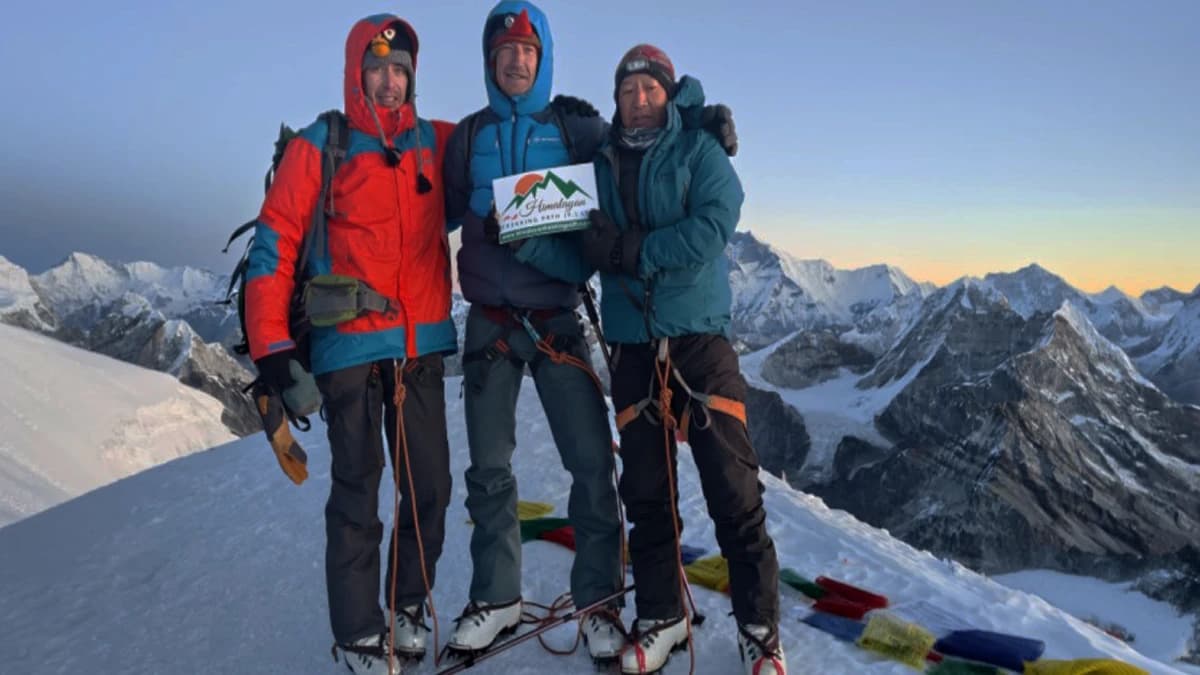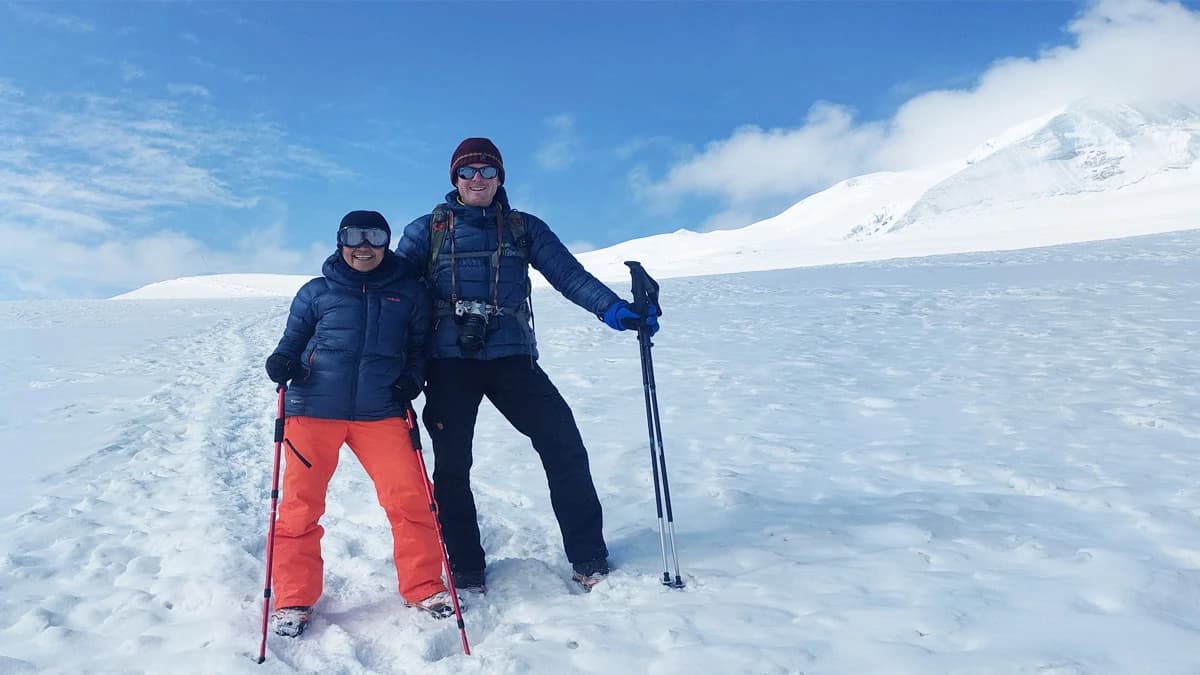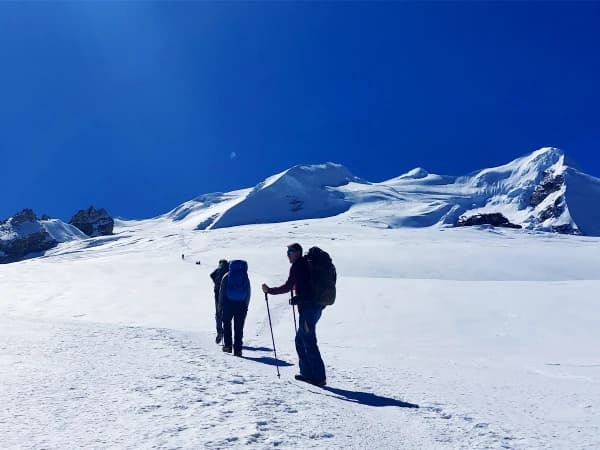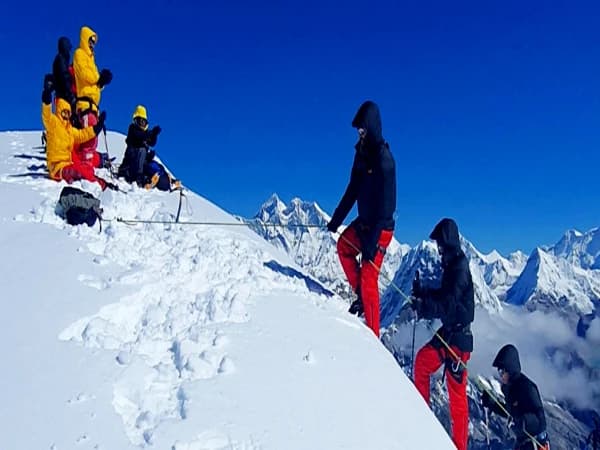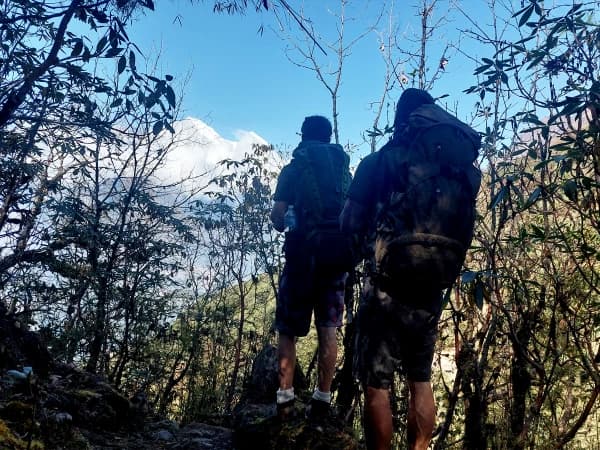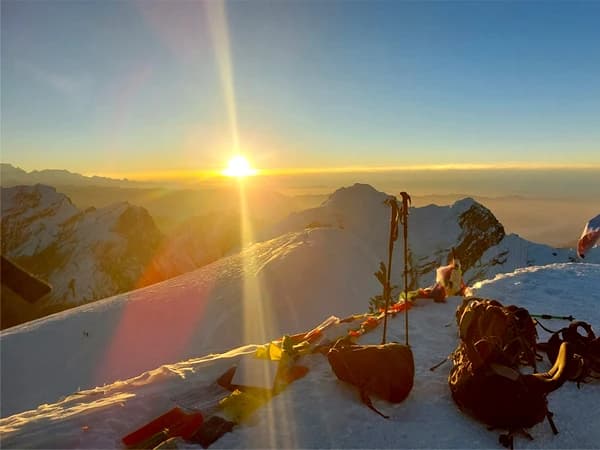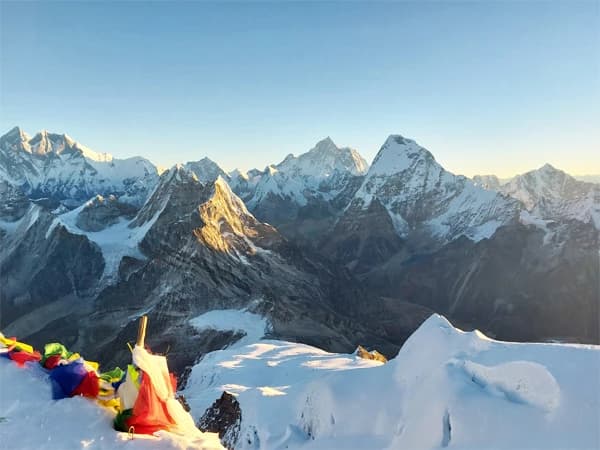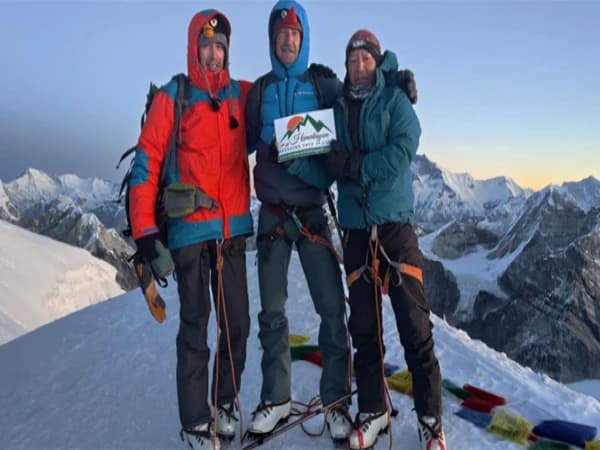Mera Peak Climbing
Mera Peak is the most thrilling and fascinating destination in the peak climbing world, offering easy accessibility, non-technical, and less challenging experiences, making an ideal destination for both beginners and seasoned climbers. Undoubtedly, Mera Peak is the highest trekking peak in Nepal, standing at 6476m above sea level. Most interestingly, the path of the Mera Peak Climbing is still not touched by the modern amenities, which is why you will get an authentic trekking experience along the journey. Most probably, this is the best wilderness tour in Nepal. There are a couple of routes that bring you to the enticing Mera Summit. Compared to the Upper route and the Classical route, the overland route is budget-friendly, and it offers more things to experience along with revealing appropriate acclimatization. The Overland Mera Peak Climbing starts with a scenic drive from Kathmandu to Salleri and eventually Khari Khola.Typically, your journey will be led by a professional Sherpa guide to Mera Peak Summit (6476m) along the charming multi-ethnic villages and picturesque landscapes of the Hinku Valley.Book overland Mera Peak Climbing with Himalayan Trekking Path to get the authentic experience, impeccable hospitality, and top-notch service at a reasonable cost.
Highlights of the Overland Mera Peak Climbing
- Pick up from Kathmandu Airport one day before heading to the trailhead via a scenic jeep drive to Khari Khola.
- Explore the hidden beauty of the Makalu Barun Conservation Area.
- Discover the original trekking paths that remain unexplored, featuring lush green forests rich in vegetation, flora, and fauna.
- Immerse yourself in the pristine natural landscapes and cultural richness of the Sherpa and Rai communities.
- Experience diverse climates, varied terrain, and breathtaking scenery as you walk.
- Confront challenging ascents, narrow paths, and gullies.
- Marvel at the stunning snow-capped peaks, glaciers, and lakes.
- Reach the summit of Mera Peak (6,476m) and witness views beyond your imagination.
- Stay at the high camp before your final ascent to Mera Peak.
- Enjoy accommodations in local teahouses, where you will experience genuine hospitality and traditions.
- Trek along the pristine trails of the less-explored Khumbu region.
- Journey back to Lukla from Zatrwa La Pass (4,600m) on your way back from Khare.
- Conclude your adventure with a scenic and thrilling flight from Lukla to Kathmandu
17 Days Mera Peak Climbing Itinerary
The 17-day overland Mera Peak climbing itinerary is one of the finest, hassle-free ways to climb Mera Peak. The trip starts with the airport pickup and then explores Kathmandu before heading to Khari Khola via a scenic drive trip. Along the drive, you will experience the uncovered villages, charming landscapes, terrace fields, mountain vistas, and many more. Embark on the Mera Peak Climbing route from Khari Khari onward to the Khare, the last village that offers the gateway to the Mera Expedition. To reach Khare (5045m), you need to spend several nights at the lower elevations, like Panggom (2863m), Ramailo Danda (2863m), Chhatra Khola (2800m), Kothe (3691m), and Thaknak (4358m). Therefore, this route provides you an opportunity to witness the several climates, vegetation according to the climates, flora and fauna, unique landscape, multi-cultural villages, and many interesting things.
Before embarking on the Mera peak climbing, you join pre-training in Khare, then head to the High Camp with the local Sherpa Experts. Throughout the journey, you have an impressive view of the mountains, lakes, and glaciers, making your journey more rewarding. Thereafter, start for the Mera Summit (6476m) from High Camp early morning for the glorious sunrise views over the world’s Highest Mountain including Everest, Lhotse, Makalu, Kanchenjunga, Cho Oyo. While you are at the top of Mera Peak, you will have a speechless moment and relish the breathtaking, glorious mountain views. Retune back to Lukla via Zatrawa La Pass before taking a flight to Kathmandu. Therefore, this is the best Mera Peak Package and its itinerary, which covers the entire route of the Mera Peak Trek. Book our Overland Mera Peak Climbing Package for lifetime memories and impeccable hospitality.
How to get Khari Khola from Kathmandu?
The most convenient option to travel from Kathmandu to Khari Khola is to take a Jeep. You can book a shared jeep for the budget-friendly option, which costs about 70$ per passenger, and for the private, it costs about 300$ per jeep. It can accommodate up to 6 people. Due to the road condition, to travel 287 km between Kathmandu and Khari Khola takes at least 11 to 12 hours. From Kathmandu, jeeps typically depart around 4:00 am to ensure arrival before nightfall. While the journey may not be the most comfortable, the breathtaking views along the way are exceptional. The route follows the BP Highway, also known as the Everest Express Road, passing through several villages and towns, including Dhulikhel, Okhaldhunga, and Salleri, before reaching Khari Khola. If you prefer, you can spend the night in Salleri and continue your journey to Khari Khola the following day. This allows you to experience the local culture and the charm of Salleri village, which serves as the administrative center of the Solu Khumbu District.
Where is Mera Peak located?
Mera Peak is the most popular peak to climb in Nepal, standing at 6476m, making it Nepal’s highest trekking peak. It is located in the Makalu Barun subsection of the Mahalangur Himalayan range (Everest region). Mera Peak is popular for both novice and seasoned climbers due to its accessible, less challenging, and non-technical ascending. Therefore, it is known as the beginner's peak in Nepal, However, it is equally popular among the seasoned climbers for training purposes. Typically, Lukla and Khari Khola are the trail heads of the Mera Peak Trek.
How long does the Mera Peak Climb Take?
The Mera Peak climb takes at least 12 days and can be extended to 22 days, depending on where you start and end. The rapid Mera peak climbing package brings you from Lukla to Mera Summit(6476m) via Zatrawa La 04610m and returns to Kathmandu by Helicopter. Similarly, the upper route takes 15 days, the Classical route takes -17 days, the Overland route takes -17 days, and the Ama Lapcha pass route requires 22 days. Contact and book the Mera peak climbing with the local expert team of the Himalayan Trekking Path for a wonderful experience at a reasonable cost.
How to reach Khare from Khari Khola?
Mera Peak is not only a climbing destination but is also interestingly renowned for the off-the-beaten-path trek in Nepal. While traveling from Khari Khola to Khare Village, you will pass numerous charming Sherpa Villages that provide a profound insight into the pure culture, hospitality, and natural diversity. Embark on a journey towards Khare from Khari Khola, traversing through the various climates, such as sub-tropical to tundra, and experiencing diverse flora and fauna throughout the route. Particularly, it requires 6 days to reach Khare from Khari Khola via Panggom, Ramailo Danda, Chhetra Khola, Kothe, and Tangnag. The trail is quite rough and untouched, mainly uphill and less downhill. The trail follows the Inkhu Khola through the enchanting Hinku and Inkhu Valley of Makalu Barun Conservation Area. Every day, the views of the mountains get even better and stunning scenery fills the journey with delights.
How many days are needed for Mera Peak climbing starting from Khare, the final village?
There are several trekking paths to reach Khare; however, only one route leads from Khare to the Mera Summit (6476m). Khare is recognized as the last Sherpa village on this journey and serves as the gateway to Mera Peak Climbing. After adequate preparation, your Sherpa guide will accompany you to Mera Base Camp (5400m), Mera High Camp (5780m), and ultimately to Mera Summit (6476m), before returning to Khare (5045m). Generally, the climb from Khare to Mera Peak takes about 2 to 3 days, typically involving one night and two days, though this can vary based on your preferences. For further assistance in planning your Mera Peak climbing adventure, please reach out to our experts at the Himalayan Trekking Path.
How is the accommodation at Mera High Camp?
The accommodation at Mera High Camp is a tent that is temporarily established during the peak season over the steady rocky flat. The tent provides a warm and comfortable night for every climber. However, the view from the High Camp is beyond imagination, alluring all the climbers and making your stay at High Camp wonderful and filling.
How is the view from Mera Peak Summit?
Mera Peak is popular for its wonderful location, which stands at the center of the Himalayan peaks of the Khumbu region. Therefore, it is the best viewpoint of the Everest, the Kanchenjunga, Lhotse, Cho Oyo, and Makalu, along with the numerous peaks. It looks especially glorious during the sunrise over the Himalayans. Climb Mera peak to fulfill your desire and prepare for the more challenging peaks to go.
Does Mera Peak have more peaks? And which peak is famous to climb?
Mera Peak has three distinct summits: Mera North, 6,476 metres (21,247 ft); Mera Central, 6,461 metres (21,198 ft); and Mera South, 6,065 metres (19,898 ft). Compared to the Mera Center and South, the Mera North is challenging and technique. Normally, Mera peak climbing on the Mera North (6476m) for the better views and thrilling experience. Therefore, you will be climbing on the Mera North during the Mera Peak Climbing.
How to prevent altitude sickness during the Mera peak Climbing?
Hydration and adequate acclimatization are crucial to prevent altitude sickness during the Mera peak Climbing. The cardiovascular related activities such as hiking, trekking, jogging, morning walks, cycling, etc, are the major preparations before heading to Mera Peak. That is very important to adjust to the challenging terrain and thin air.
Mera Peak Climbing Package: Adventure Awaits
Our 17-day Mera Peak Climbing package begins with an exciting overland drive by jeep to Khari Khola. From there, we will embark on the famous Mera Peak expedition with our expert team. During the jeep ride, you'll be treated to the stunning scenery of the lower Khumbu region, including charming villages, cultivated farmland, river valleys, and lush green hills that will captivate your attention throughout the journey. Although the overland trip may not be the most comfortable, the breathtaking views will make it well worth it. We have crafted this Mera Peak climbing itinerary to mitigate potential flight delays due to bad weather conditions, which are common in peak season, and to provide you with experiences you won't find elsewhere. From Khari Khola, we'll ascend to Pangkoma Village, which involves a 2 to 3-hour trek. Pankoma is the connecting point for both the overland and trail from Lukla.
From Pangkoma, we'll head to Khare (5000m) via Ramailo Danda, Chhatra Khola, Kothe, and Tangnang. Along the trail, you will encounter colorful villages, lush green valleys, waterfalls, and monasteries, showcasing the rich flora and fauna of the region. As we gain elevation, the scenery evolves- lush greenery gives way to barren rocky trails, and you will explore alpine meadows before transitioning to stunning views of rocks, glaciers, lakes, and mountains. From Khare, the journey continues to Mera Base Camp and then to High Camp, following a challenging trail that offers expansive mountain vistas. You will spend the night in a tent at High Camp before attempting the summit of Mera Peak (6476m). On your way to the summit, you'll witness mesmerizing mountain views illuminated by the dawn light. Be sure to capture every moment of this journey through paradise with its panoramic views. After celebrating your successful ascent, you will return to Khare. The trek back to Lukla will take you through Kothe, Thuli Kharka, Zatrwa La Pass, and Chutanga, finally arriving in Lukla. After an overnight stay in Lukla, you will fly back to Kathmandu, concluding our 17-day Overland Mera Peak experience. Thank you for choosing our Mera Peak package and giving us the chance to make this an unforgettable journey.
Overland Mera Peak Climbing Breakdown Itinerary:
Our 17-day Mera Peak Climbing Itinerary offers an excellent opportunity to explore the entire Mera Peak trail. The journey begins with an overland drive from Kathmandu to the trailhead in Khari Khola. From there, we will trek to Khare, passing through Pangoma, Ramailo Danda, Chhatra Khola, Kothe, and Tangnang. Khare serves as the gateway to begin the Mera Expedition. After reaching the summit, we will return to Kathmandu via Lukla, enjoying a scenic flight. Below is a brief overview of the Mera Peak Expedition Itinerary:
- Day 01: Arrival at Kathmandu Airport and Transfer to Hotel (1350m)
- Day 02: Kathmandu to Salleri by Scenic drive (268km): 7/8 hours
- Day 03: Salleri to Pangkoma (2,804m/9199.475ft) via Khari Khoa Drive: 25 km, 5/6hrs)
- Day 04: Trek from Pangkoma to Shibuche (2,854m/9363.517ft): 4.5 km 4/5hrs)
- Day 05: Trek from Shibuche to Chhatra Khola (3,122m/10242.78ft), 12 km, 7hrs)
- Day 06: Trek from Chhatrakhola to Kote (3,580m/11745.41ft): 10 km, 6hrs
- Day 07: Trek from Kote to Tangnang (4,358m/14297.9003ft :7 km, 3/4hrs)
- Day 08: An Extra Day at Tangnang for rest and acclimatization
- Day 09: Tangnang to Khare (5,045m/16581.36ft): 7km:3/4 hours
- Day 10: Acclimatization and Training Day in Khare
- Day 11: Trekking from Khare to High Camp (5,780m/18963.25ft): 8km: 5/6 hours
- Day 12: Trek from High Camp to Mera Peak Summit (6,476m/21246.72ft) and back to Khare, overnight in Lodge or guesthouse: 18 km:7/8 hours
- Day 13: Trek From Khare to Kote (3,580m/11745.41ft):14 km, 6/7 hours trekking
- Day 14: Trek From Kote to Thuli Kharka (4300m/14107.61ft): 11km, 6/7 hours Trekking
- Day 15: Trek from Kharka to Lukla: 2,860 meters (9,383 ft):10.1 km, 6/7 hours
- Day 16: Lukla to Kathmandu (1350m/4429.134ft): 35 minutes flight and transfer to hotel
- Day 17: Departure Day
The Best Season for Mera Peak Climbing
the Mera Peak expedition, choosing the right time is crucial for a rewarding experience and successful climb. Similar to other peak climbs, the best seasons are Spring and Autumn. During these optimal times, the weather is stable, and temperatures are pleasant.
- Autumn Season: The best months for climbing Mera Peak are September, October, and November. During this period, temperatures in the lower trekking areas are comfortable, and it's not too cold at the summit. The stable weather conditions during these months, along with minimal rainfall and snowfall, provide stunning views of the mountains and valleys. Additionally, the risk of avalanches is reduced, making the climbing expedition safer.
- Spring Season: The second-best season for climbing Mera Peak is spring, followed by autumn. The months of March, April, and May offer excellent weather conditions and temperatures. During this time, the blooming flowers and stunning mountain views benefit from good visibility. Days are longer, making it less cold at the summits, while temperatures are quite warm in the lower elevations of the trek.
- Winter Season: Winter is not the optimal time for climbing Mera Peak; however, some expeditions still operate during December, January, and February. The weather can be unstable and very cold, often leading to blocked trails. If you plan to embark on an expedition during the winter months, be prepared for potential delays and ensure you have adequate preparation.
- Rainy Season: The rainy season is not the best time for climbing Mera Peak due to heavy rain, floods, landslides, and poor visibility caused by inclement weather. The rainy season occurs in June, July, and August. While the high mountains may be clear, the lower sections of the trekking trail can be affected by wet conditions and landslides. If you are planning to climb Mera Peak, it is important to allow for additional days and to make thorough preparations.
Permit for Climbing Mera Peak
For the Mera Peak climbing journey, several permits are required: trekking permits, climbing permits, and local government permits. Additionally, a garbage deposit is required. The required formalities, documents, permits, and fees are as follows:
- Makalu Barun Conservation Areas Permits: The conservation permits are compulsory, and the cost for these permits is USD30 per person and requires a copy of one's passport copy
- Pasang Lhamu Rural Municipality: The cost of the Pasang Lhamu Municipality fee is USD 30 per person, and a passport copy is required
- Mera Peak Climbing Permit Fees: The fees for Mera Peak climbing permits vary depending on the season. During the autumn season, which runs from September to November, the fee is USD 125. In the spring season, from March to May, the fee increases to USD 250. For the off-season months of June, July, August, December, January, and February, the fee is USD 70 per person. A valid passport and a passport-sized photo are required for these permits.
- Garbage Deposit Fees: Each expedition team is required to deposit USD 500 for waste management. All associated fees are included in the package.
Overland Mera Peak Climbing Cost for 2025-2026 Season in Nepal.
The cost of the overland Mera peak Climbing starts 2100$ per person to 2400$ per person depending on group size and your preference. The cost of climbing Mera Peak is influenced by various factors, including group size, package selection, duration, itinerary, and the level of service provided. This package encompasses all services from arrival to departure, including transportation from Kathmandu to Khari Khola via shared jeep, necessary permits, accommodation, a guide, climbing equipment, meals, porter services, and the return flight from Lukla to Kathmandu. Please visit our cost includes and excludes sector for detailed information about the package, itinerary, and Cost. Book the Mera peak package with us for better offers at a low cost
Here is the breakdown of the cost of climbing Overland Mera Peak for 2025- 2026
- For solo climbers, the cost of the Overland Mera Peak package is USD 2700.
- Mera Peak climbing overland Package for groups of 2-6 people: The cost is USD 2250 per person.
- For groups of 7-10 participants, the cost of the Mera peak overland package is USD 2100 per person.

